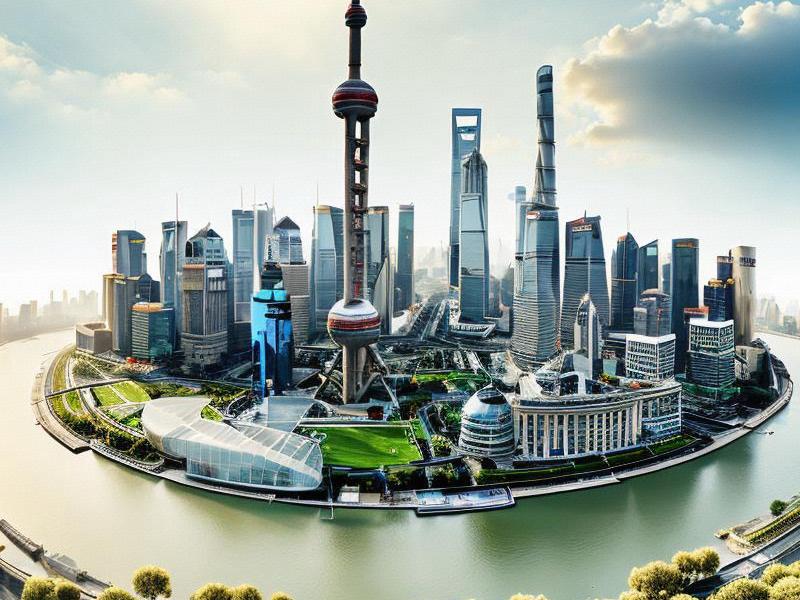This article delves into the remarkable transformation of Shanghai, exploring its journey towards becoming a global hub for innovation and sustainability. It highlights the city's efforts in economic restructuring, technological advancements, environmental protection, and urban development.

Shanghai, the vibrant metropolis on the banks of the Huangpu River, has long been a symbol of China's rapid economic growth and urbanization. Over the past few decades, it has undergone a profound transformation, evolving from a traditional industrial base to a global center of innovation and sustainability.
Economic Restructuring and Technological Advancements
In recent years, Shanghai has been at the forefront of China's economic restructuring. The city has successfully transitioned from a manufacturing-driven economy to one focused on high-tech industries, finance, and services. This shift has been driven by the government's strategic planning and the city's commitment to innovation.
The establishment of the Zhangjiang Hi-Tech Park in the late 1990s marked a turning point for Shanghai's technological ambitions. Today, the park is home to numerous leading technology companies, research institutions, and startups, fostering a vibrant innovation ecosystem. It has become a magnet for talent and investment, contributing significantly to the city's economic growth.
Shanghai's financial sector has also seen remarkable development. The launch of the Shanghai Free Trade Zone in 2013 has further enhanced the city's status as an international financial hub. The zone has attracted a large number of multinational corporations and financial institutions, facilitating cross-border trade and investment.
Moreover, Shanghai has been actively promoting digital transformation across various sectors. The city's government has implemented initiatives to improve digital infrastructure, enhance data security, and encourage the adoption of emerging technologies such as artificial intelligence, big data, and the Internet of Things. These efforts have enabled businesses to innovate and compete on a global scale, driving economic growth and improving the quality of life for residents.
上海贵族宝贝sh1314
Environmental Protection and Sustainability
As a global city, Shanghai recognizes the importance of environmental protection and sustainability. The city has implemented a series of measures to address environmental challenges and promote sustainable development.
One of the key initiatives is the promotion of green buildings and energy-efficient technologies. Shanghai has set ambitious targets for reducing carbon emissions and improving energy efficiency, encouraging the construction of energy-efficient buildings and the adoption of renewable energy sources. The city's green building standards have become a benchmark for other cities in China and beyond.
Shanghai has also been actively promoting waste management and recycling. The city has implemented strict regulations on waste disposal and encouraged residents to adopt sustainable practices such as composting and recycling. The establishment of waste-to-energy facilities has further reduced the amount of waste sent to landfills, contributing to a cleaner and healthier environment.
In addition, Shanghai has been investing in public transportation and promoting green mobility. The city has developed an extensive network of metro lines, buses, and ferries, providing convenient and affordable transportation options for residents. The introduction of electric buses and the expansion of bike-sharing programs have further reduced traffic congestion and air pollution, improving the overall quality of life in the city.
上海花千坊爱上海
Urban Development and Quality of Life
Shanghai's urban development has been guided by a vision of creating a livable, sustainable, and inclusive city. The city has implemented a series of measures to improve infrastructure, enhance public services, and promote social equity.
One of the key priorities is the development of affordable housing. Shanghai has introduced various policies to increase the supply of affordable housing units, ensuring that residents have access to safe and comfortable living conditions. The city has also been promoting the renovation of old residential areas, improving infrastructure and public services in these neighborhoods.
Shanghai has also been investing in education, healthcare, and cultural facilities to enhance the quality of life for its residents. The city has established world-class universities and research institutions, attracting top talent and fostering innovation. The expansion of healthcare facilities and the improvement of medical services have ensured that residents have access to high-quality healthcare.
Cultural tourism has become an important part of Shanghai's urban development. The city has preserved its rich cultural heritage while embracing modernity, creating a unique blend of traditional and contemporary culture. The Bund, the former French Concession, and other historical landmarks have become popular tourist attractions, attracting millions of visitors each year.
上海娱乐
Challenges and Future Outlook
Despite its remarkable achievements, Shanghai faces several challenges in its journey towards becoming a global hub for innovation and sustainability. One of the main challenges is the need to address environmental issues such as air pollution and water quality. The city must continue to invest in green technologies and promote sustainable practices to ensure a healthy and livable environment for its residents.
Another challenge is the need to address social inequality and promote social equity. Shanghai must continue to invest in education, healthcare, and public services to ensure that all residents have access to opportunities and resources. The city must also promote inclusive policies to ensure that marginalized groups are not left behind.
Looking ahead, Shanghai has the potential to become a global leader in innovation and sustainability. The city must continue to embrace technological advancements, promote green development, and enhance the quality of life for its residents. By addressing the challenges it faces and seizing new opportunities, Shanghai can achieve its vision of becoming a livable, sustainable, and inclusive global city.
In conclusion, Shanghai's transformation is a testament to the city's resilience, innovation, and commitment to sustainability. The city has successfully navigated the challenges of rapid urbanization and economic restructuring, emerging as a global hub for innovation and sustainability. As Shanghai continues on its journey, it serves as a model for other cities around the world, demonstrating that economic growth and environmental protection can go hand in hand.